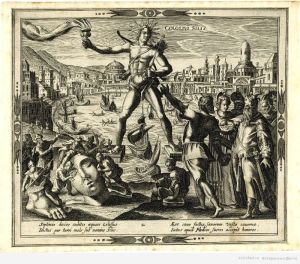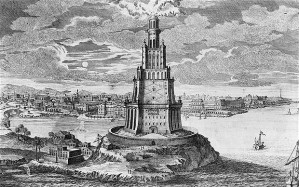This is a sequence of poems, a year in the making, inspired by the seven wonders of the ancient world as compiled by Antipater of Sidon. He described the Temple of Artemis at Ephesus as follows:
“I have set eyes on the wall of lofty Babylon on which is a road for chariots, and the statue of Zeus by the Alpheus, and the hanging gardens, and the colossus of the sun, and the huge labour of the high pyramids, and the vast tomb of Mausolus; but when I saw the house of Artemis that mounted to the clouds, those other marvels lost their brilliancy, and I said, “Lo, apart from Olympus, the Sun never looked on aught so grand”.
THE CRUSADER AT HALICARNASSES
I awoke in a dream of angels:
Knight of St John, said one, go to the window
and see the mausoleum restored from ruin,
like a palace of heaven, a castle on the moon.
I seized my sword, threw on a scarlet cloak.
The moon hid in the branches of a Hazel Tree.
I tied up my horse and crept on foot to the place
where it blazed up like an apparition.
The marble glared so bright it burned my eyes.
Lions of winters stood guard over the stairway
and robed figures roamed the ghostly halls.
Columns rose as proud as the bones of Apollo
and at the top were the four horses of Artemis
and Mausolus riding the clouds to the stars.

SELLING THE COLOSSUS
Once, in Edessa, an old man stayed my arm.
This vase of brass, he said, was forged
from the hand of the Titan, the god who calmed
the seas of Rhodes; who for fifty years gorged
on clouds with a lamp on an upturned palm.
I saw it myself, the fractured colossus, broken
in the quake, Chares‘ folly, toppled from his plinth
who lay a thousand years, so it is spoken,
before sold on for scrap, to my master’s gain,
who swore: I will move this giant of Corinth
on the backs of nine hundred camel, a train
so vast we will gleam like a snake of brass.
So take this vase, you sailor, whose name
will be he who holds a wonder from ages past.

THE GARDENER
Nebuchadnezzar, his name widely known,
planted lush palms on a hillside of stone.
On pillars and beams and columns of white,
a new Persia bloomed to Amytis’ delight.
A garden for a queen, a folly of love,
where bountiful vines spilled down from above
On blue stone steps, water constantly ran
quenching the trees where the nightingales sang
An orchard of plenty, the bounty of heaven:
pomegranates, apricots, dates and melon.
It was evergreen forest of exquisite shades
with fountains of light and sunlit glades
A thousand men worked for thousands of hours
tending the roots, sewing oceans of flowers.
But the queen grew tired of this fake paradise,
leaves cease to gleam, fruits failed to entice.
So the king built it higher, knowing she’d rather
walk the mountains of home, the lands of her father.

THE GREAT TOWER OF GIZA
Oh Khufu, my Pharaoh,
think again on your tomb
and let me build instead, Pharaoh,
a tower of a thousand rooms
adorned with the likeness of Bast and Qebui,
stone gods of Egypt, giants in the sky.
It will stand like a needle, its shadow on the Nile
reaching up a mile!
And if you let it be so, I can begin within weeks,
and the scaffold alone will be envied by Greeks.
They will marvel at this spear rising from the sand
and wonder at the miracle of levitating stone
with balconies on the stars and views of all your land.
Your enemies will quake at the very sight
at the peak of your ambition, your terrible might.
And when the bricks are all in place
you will travel far up into space
on an elevator of rope and wood.
Why have a pyramid, when it could be this good?
ARTEMIS AT THE TEMPLE
She returns at night
with her four golden deer
to the field at Ephesus
where her temple once stood:
the broken stone,
the purple flowers.
In the long grass she stands,
her bow at her side,
looking up at the lines
of stars that remake the roof,
the beams of moonlight
which shine through the clouds
that rebuild the columns.
She will not stay for long
just until she finds
the belt of Orion,
and the bright wound
at his heart, where she shot
her lover and lost her soul.
Then she turns and flees
and there is nothing
but the fragments,
and the wind blowing
through the Cyprus trees.

STATUE OF ZEUS IN THE WORKSHOP AT OLYMPIA
Wake, noble Phidias, sculptor of Greece,
and drink from your cup of black glass.
The sun has warmed my ivory feet;
your hands have built me to last.
You have toiled these years on my wooden frame,
and clad me in panels of gold,
I have held this sceptre and wore these robes
I am the god that will never grow old.
I have heard you whistle your tuneless songs
while gilding my olive wreath,
and working the metal I hold in my hand,
and chipping away at my teeth.
These years I have known you and watched you work
I have some advice for you now,
It is not good for a man to make a god
But I envy the sweat on your brow.
When they find your workshop two thousand years hence
your name will be found on your cup
I am pleased good Phidias with the work you have done
So sing your songs, pour your wine and sup.

MARK ANTONY AND THE LIGHTHOUSE
They did not tell you this;
that Arsinoë was more beautiful than her
although she had her sister’s temper
and her father’s talent with the flute.
Even with Cleopatra, I thought
of her shimmering mouth, her eyes
like ochre and the mind that shone
like the Lighthouse at Alexandria.
I have not spoken of the night
we eloped, anointed by the great seas
of Poseidon; to the wonder at Pharos,
the fortress of light above the ocean.
I listened to her breath, as we climbed
like gods into the sky, her jewels
glittering like the aether, the river
of stars that sweeps through the heavens.
Halfway we broke pomegranates,
and shared arils between us like rubies.
Below we saw the corn barges,
their decks heaped with gold.
At the top, I told her we could not
marry, that all of Egypt looked to me.
She burned like the flame itself,
cursing us, hissing like the poison asp.
In the morning, Cleopatra lay on the pillow,
plainer than I had ever seen her;
as plain as the nose on her face.










